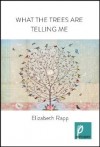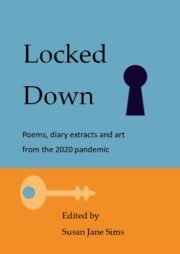
Perfect bound. 88 pages. £7.95
ISBN 978-1-909404-24-3
Publication date 15th November
A review by Rosie Bailey
This is Rapp’s fourth collection. Those who already know her work will recognise at once her highly individual voice, the voice of a serious and experienced writer with a well stocked mind. Perhaps, in these times, unfashionably, Rapp writes only when she has something to say. Often what she has to say is difficult or elusive, but it’s generally important, something that – though it may puzzle them – certainly makes her readers think. She’s not one for easy answers: in ‘Deposition’, for instance, about a dead vixen whose bullet-scarred body, hanging on a barbed-wire fence, is ‘a stink of decay’:
‘Smelly old thing’, you mutter,
tipping her on to the grass…
but the poem brings you up sharp at the end with the animal’s ‘neat black claws’ which ‘clench downwards’
like a ballerina’s bloody points.’
For her, the moon has no traditional baggage; its ‘arc light’ is disturbing, threatening, ‘immaculate and cruel’. (‘Lunatic light’)
Always the reflective work of an attentive thinker, over the years Rapp’s writing has become more concise, more economical. She’s good at creating atmosphere, good at urgency and intensity; she has a freshness, an accuracy of the imagination, and an off-hand mastery of detail that come only through years of practice. And she can go for the jugular: the eight-liner ‘Grief’ ends simply ‘my bones are stone / about to break’.
As in the colliding perspectives of ‘The haven of thy resurrection’, there’s no place to hide, no room for sentimentality:
Who is this heap of rags the wind blows through?
I am this soldier, dauntless in battle…
Who is this old woman, battered in her bed?
I am this bride, offering white roses…
She has a playfulness with language and form that means that no two poems are alike. The steady descriptive notes of some of her earlier work, which tended to slow the poems down, are for the most part gone in this collection; these poems each wear their own clothes, leap into life individually on the page. ‘A little night music’ begins
my house weaves music
round me while I sleep
stones sigh, stir and settle
old bones on the hearth
the dry cough of floorboards
as weightless feet pass by
skinflakes of the dead
settle in my lungs…
– whereas ‘Mad Trombone’ picks up the zany accidentals of fact and feeling with no concession to sobriety:
On a night when the wind
was breaking the neck of the woods,
when a parrot, a lizard and seven cats
slept hugger-mugger ina flower-pot,
when the test match score
made England blush bright red,
when I waited a second week
for your letter on the mat…
These poems don’t die away on the page after the first glance. This is a collection to read and re-read; [TITLE?] has gained assurance and maturity during the long silence since her last volume. Try this for size:
A ring of stones
The healing place is a ring of stones
where my father lifts an axe to fell
an ash tree hung with golden fruit.
He has the strength of a pedigree bull.
My mother dances a matador’s dance,
teases the bull with a bloodstained cloth.
She hides her face behind a veil
woven from dust and linnet’s feathers.
My brother drifts in a purple hammock,
swings between two stones: plays chess
against himself but always loses.
We do not speak. Nobody speaks.
I am a young goat chained to a pole
bleating with terror, with hunger, with thirst.
My father stops chopping the tree. My mother
stops dancing. My brother picks up a knife.
Perfect bound. 88 pages. £7.95
ISBN 978-1-909404-24-3
Publication date 15th November
————————————————————————————————————————————-
Elizabeth Rapp
(photograph by Ryan Hebron-Wheatley)








